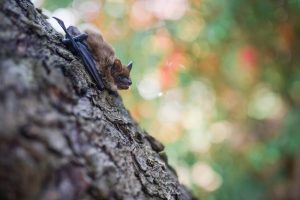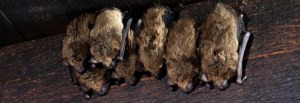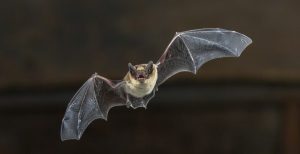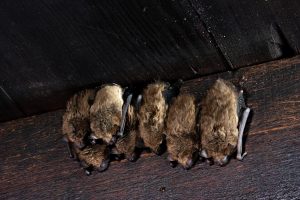Bats are some of the unsung heroes of the animal kingdom. They are the most significant predators of night-flying insects, consuming pests such as fruit flies, gnats, beetles, and mosquitos.
Because of their small size and ultra-high metabolism, bats must consume a great deal of food for their size. Their appetite is so voracious that a single little brown bat—with a body size no larger than an adult human’s thumb—can eat 4 to 8 grams (the weight of about a grape or two) of insects per night. Many people build bat houses to invite bats onto their property for pest control!
But while bats are great to have around, they can quickly wear out their welcome by invading your home. If this happens, it’s important to know what threat, if any, they pose.
Are Bats Dangerous to Have in Your Home?
It is highly unusual for a bat to attack someone, so they are not a direct threat. With that said, they are reservoirs of zootonic diseases that can be transmitted to humans, such as rabies. Their droppings (bat guano) can facilitate the growth of histoplasmosis.
They can also introduce ectoparasites (ticks, mites, fleas) that can remain even after the bats are gone. It is for these reasons that if a bat gets into your home, it should be removed as quickly as possible—check out our bat removal guide for more information.
Given the number of diseases they are capable of spreading, one should never attempt to handle bats with bare hands.
Are Bat Bites Dangerous?
All bats in the United States are insectivores, but only in the Americas can bats carry the rabies virus. Their teeth are designed to eat insects so a bat bite can go unnoticed. Some bats do have a strong enough bite and sharp enough teeth to break skin.
Bats are the leading cause of rabies deaths in the United States, but most bats do not carry rabies. If you find a bat inside your house, avoid direct contact with it.
Are Bats Dangerous to Your Home?
Fortunately, bats have no direct structural damage to the homes they occupy—they don’t create their entry holes, nor do they cause damage from chewing or gnawing, like mice and rats.
Bats inside your house can be dangerous to you and your family.
Dangers of Bat Guano
Wherever bats live, there will likely be a musty, ammonia-like odor, which is due to their urine. This urine, as it happens, is highly acidic and can even corrode metal. There will also be piles of bat guano near the entry point (bat droppings are small and cylindrical, usually tapered at the ends and crumbly in texture).
Bats also secrete oil through their chest, and when they rub against the walls of the roost site, the oil is imparted to the wall, resulting in oil stains.
Are Bats Dangerous to Your Home?
While nobody can deny bat’s ecological benefits, they cannot be ignored if they’re inside your home. However, there are restrictions on how to legally perform bat removal near you.
Bat species currently listed as endangered on the federal level include the Indiana, hoary hat, gray, Florida bonneted, and little Mariana bats. In addition, the Mexican long-nosed, Pacific sheath-tailed, Virginia big-eared, and Ozark big-eared bats are listed for protection.
The federal threatened list includes the Mariana fruit bat and the Northern long-eared bats, while the tri-colored and little brown bats are under review for being endangered.
Each state determines the bats specific to their state’s circumstances to list as threatened or endangered species. For example, Pennsylvania endangered bats include the Northern long-eared, Indiana, the little brown bat, and the tri-colored bat. In Texas, the Mexican long-tongued, Mexican long-nosed, Southern yellow, Spotted, Rafinesque big-eared bats are listed as threatened or endangered.
If you notice any of the aforementioned signs of bats in your house, give our team of experts a call. We’ll work around your schedule to deal with the problem ethically and expeditiously.
Bat Removal Near Me

Bats in Jacksonville, FL
There are 13 species of bats in Florida; several of these, including little brown and big brown bats, may be found in residential homes and

Bats in Tampa Bay, FL
Florida is home to thirteen bats, and all of them eat insects. Residents in Tampa Bay can experience incredible benefits from bats on their property.

Bats in Orlando, FL
Bats are found in nearly every geographic region in Florida. Their favorite environments include tropical forests, woodlands and open fields. Natural roosting spots include caves,

Bats in Kansas City
Kansas is home to fifteen species of bats, and all of them are insectivores. Bats in Attic in Kansas City Bats in Kansas naturally roost

Bat Removal in Northeast Ohio
There are eleven species of bats commonly found in Ohio. The solitary species are the hoary bat, the silver-haired bat, and the Eastern red bat.

Bat Removal in Raleigh
The most humane way to get rid of bats is to let them evict themselves. A bat valve allows bats to fly out of your


